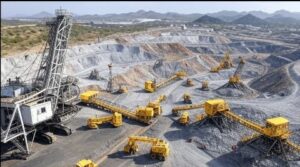SYDNEY– Boart Longyear Ltd., the world’s biggest provider of drilling services for the mining sector, has tried everything from a new chief executive to slashing thousands of jobs to weather a global downturn in resources spending.
Now, management is considering an even more drastic approach: breaking the Utah-based company up.
Boart Longyear said on Monday it has hired Goldman Sachs to carry out a strategic review of the business, which is reeling from a downturn in exploration globally as prices for commodities such as copper have fallen.
The company recorded a net loss of US$620 million for the 12 months through December, down from a US$68 million profit a year earlier, painting a bleak outlook for the year ahead despite recent signs of a revival in the global economy.
“2013 was a brutal year,” Kent Hoots, the head of Boart’s global products division said on a conference call Monday.
A onetime darling of the resource-rich Australian stock exchange, Boart rode the commodities boom as mining companies ventured deep into the jungles of Africa and arid regions such as Mongolia’s Gobi desert in search of new deposits to feed Asia’s demand.
Now, it is has become one of the biggest victims of a slowdown in mining investment as companies plow earnings into existing developments and return more cash to shareholders instead. BHP Billiton Ltd., the world’s largest mining company by market value, cut capital and exploration spending by 28% to US$7.9 billion in the six months through December.
Boart, which generates 75% of its revenue from drilling services, said that in the last three months of fiscal 2013 only three out of every 10 drilling rigs were operating. The company has seen its market value shrivel to less than 200 million Australian dollars (US$179 million) from a peak of around A$4 billion before the global financial crisis in 2007.
Boart isn’t the only mining services provider feeling the heat as a long mining boom slows. Australia’s Forge Group Ltd. this month laid off 1,300 workers after calling in insolvency specialists as its lenders withdrew financial support.
Heavy machinery firm WesTrac–an authorized dealer for Caterpillar Inc. equipment in Australia owned by Seven Group Holdings Ltd.–said late last year it would ax hundreds more jobs.
In Australia, the resources sector accounts for almost 10% of the nation’s jobs–around double the level a decade ago–and close to 20% of national output. In recent years, much of the employment growth in the industry has come from companies that service mining operations, including power generators, engineering firms, and those that ferry raw materials to ports for export.
The mining services downturn isn’t confined to Australia, however. In Canada, Cabo Drilling Corp. reported a loss for the three months through September and said revenue was down more than 50% on a year earlier.
Boart said the latest review could lead to a refinancing, recapitalization, sale of assets or a possible breakup of the firm’s drilling services and products divisions aimed at reducing debt. It didn’t provide any deadline for the review.
The mining services company has already taken drastic steps in the past year to shore up its balance sheet, shedding 2,600 workers, axing dividend payments, and relocating its manufacturing operations from Perth, in Western Australia, to a cheaper plant in Poland.
In 2012, the company ousted Craig Kipp as chief executive following a sharp decline in the company’s share price. He was succeeded by Richard O’Brien, the former chief executive of Newmont Mining Corp.
Monday’s result included US$461 million in restructuring costs and asset write downs.
Write to Rhiannon Hoyle at rhiannon.hoyle@wsj.com
Subscribe to WSJ: http://online.wsj.com?mod=djnwires
















